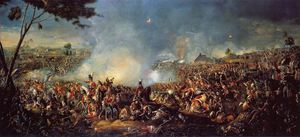- ^ The term "Austrian Empire" came into use after Napoleon crowned himself Emperor of the French in 1804, whereby புனித ரோமப் பேரரசின் இரண்டாம் பிரான்சிஸ் took the title Emperor of Austria (Kaiser von Österreich) in response. The புனித உரோமைப் பேரரசு was dissolved in 1806, and consequently "Emperor of Austria" became Francis' primary title. For this reason, "Austrian Empire" is often used instead of "Holy Roman Empire" for brevity's sake when speaking of the Napoleonic Wars, even though the two entities are not synonymous.
- ^ Both Austria and Prussia briefly became allies of France and contributed forces to the French invasion of Russia in 1812.
- ^ Russia became an ally of France following the Treaty of Tilsit in 1807. The alliance broke down in 1810, which led to the French invasion in 1812. During that time Russia waged war against Sweden (1808–1809) and the Ottoman Empire (1806–1812), and nominally against Britain (1807–1812).
- ^ Spain was an ally of France until a stealthy French invasion in 1808, then fought France in the Peninsular War.
- ^ Sicily remained in personal union with Naples until Naples became a French client-republic following the Battle of Campo Tenese in 1806.
- ^ Nominally, Sweden declared war against the United Kingdom after its defeat by Russia in the Finnish War (1808–1809).
- ^ Napoleon established the Duchy of Warsaw, ruled by the Kingdom of Saxony in 1807. Polish Legions had already been serving in the French armies beforehand.
- ^ The French Empire annexed the Kingdom of Holland in 1810. Dutch troops fought against Napoleon during the Hundred Days in 1815.
- ^ The French Empire annexed the Kingdom of Etruria in 1807.
- ^ The Kingdom of Naples, briefly allied with Austria in 1814, allied with France again and fought against Austria during the Neapolitan War in 1815.
- ^ Sixteen of France's allies among the German states (including Bavaria and Württemberg) established the ரைன் கூட்டமைப்பு in July 1806 following the Battle of Austerlitz (December 1805). Following the Battle of Jena-Auerstedt (October 1806), various other German states that had previously fought alongside the anti-French allies, including Saxony and Westphalia, also allied with France and joined the Confederation. Saxony changed sides again in 1813 during the Battle of Leipzig, causing most other member-states to quickly follow suit and declare war on France.
- ^ Denmark-Norway remained neutral until the Battle of Copenhagen (1807). Denmark was compelled to cede Norway to Sweden by the Treaty of Kiel in 1814. Following a brief Swedish campaign against Norway, Norway entered a personal union with Sweden.
- ^ The Ottoman Empire fought against Napoleon in the French Campaign in Egypt and Syria as part of the பிரெஞ்சுப் புரட்சிப் போர்கள். During the Napoleonic era of 1803 to 1815, the Empire participated in two wars against the Allies: against Britain in the Anglo-Turkish War (1807–1809) and against Russia in the Russo-Turkish War (1806–1812). However, Russia was allied with Napoleon 1807–1812.
- ^ These four states were the leading nations of the Confederation,but the Confederation was made up of a total of 43 principalities, kingdoms, and duchies.
- ^ Was a commander for the French Empire, as Marshal Jean-Baptiste Bernadotte, 1804–1810.
- ^ Joseph Bonaparte ruled as Joseph I of Naples and Sicily from 30 March 1806 to 6 June 1808, and of Spain from 8 June 1808 to 11 December 1813. He also served as a French commander before and after these two reigns.
- ^ Qajar dynasty fought against Russia from 1804–1813; the Russians were allied with Napoleon 1807–1812.
- ^ Kingdom of Hungary participated in the war with separate Hungarian regiments[2][3] in the Imperial and Royal Army (the "royal" part has referred to the Apostolic Kingdom of Hungary since 1745) and also by a traditional army ("insurrectio").[4] The Hungarian Diet voted to join in war and agreed to pay one third of the war expenses. It also authorized the crown to recruit soldiers in Hungary. Francis I ruled the country as King of Hungary because Hungary was only formally part of the Empire of Austria. The kingdom was regnum independens, a separate Land as Article X of 1790 stipulated.[5] His new title (Emperor of Austria) did not in any sense affect the laws and the constitution of Hungary according to the Hungarian Diet and the proclamation of Francis I in a rescript, thus the country was part of the other Lands of the empire largely through the monarch.
|

